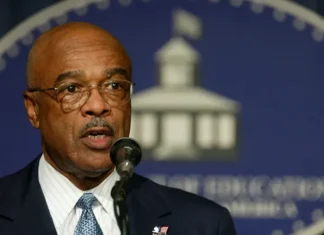By David W. Marshall
(Trice Edney Wire) – At first glance, the numbers don’t make sense. At one point there was approximately 700 Confederate monuments spread throughout 31 states and the District of Columbia. Yet, there were only 11 states which formed the Confederate States of America.
Historians have noted that most of the Confederate memorials were not built with the intention of honoring fallen soldiers, but to continue advancing the ideas behind White supremacy. James Grossman, the executive director of the American Historical Association, says the increase in statues and monuments was clearly meant to send a message.
“These statues were meant to create legitimate garb for White supremacy, Grossman said. “Why would you put a statue of Robert E. Lee or Stonewall Jackson in 1948 in Baltimore?” The Civil War was a culture war which ended in 1865 on the battlefield, but the war has never ended in the hearts and minds of those sympathetic to the Confederate cause.
In other words, the spirit behind the war still rages on. While slavery and Reconstruction, as distinct eras of our long and turbulent history ended over a century ago, the abolishment of slavery never ended racial hatred. Nor did the end of Reconstruction stop the unwillingness to grant people of color full rights as American citizens and as human beings.
The belief in White supremacy and the never-ending desire to defend it is not limited to the boundaries of former Confederate states. Nor is it constrained by time. There are five major institutions in the United States: the family, education, government, economic and religion. The connection from our past history to our current events shows that each institution has found their unique way of preserving, defending, and advancing the Confederate cause of White supremacy. This would also include our U.S. Army.
Organizations such as the Sons of Confederate Veterans and the United Daughters of the Confederacy were influential in having roughly 1,500 symbols of Confederacy placed in public spaces. These organizations totally ignored the act of treason when forces from the Confederate States of America attacked the United States military garrison at Fort Sumter, South Carolina, thereby starting the American Civil War.
Having major U.S. military installations in the South named after Confederate officers who supported the Fort Sumter attack is not only an insult to people of color, but to all true Americans. Nine southern Army bases were named after treasonous Confederate officers who fought against the Unites States Army to preserve slavery and White supremacy. The bases include: Fort Polk, Louisiana; Fort A.P. Hill, Virginia; Fort Lee, Virginia; Fort Hood, Texas; Fort Gordon, Georgia; Fort Rucker, Alabama; Fort Pickett, Virginia; Fort Bragg, North Carolina; and Fort Benning, Georgia.
Rather than covering White supremacy in ways to make it appear legitimate, it should always to be exposed in the manner it is presented along with highlighting its true intent. Fort Benning was named after Henry Benning who, in a speech inviting Virginia to join the Confederacy, said Georgia had chosen to secede because “a separation from the North was the only thing that could prevent the abolition of slavery,” warning that if slavery was abolished, “then we will have Black governors, Black legislatures, Black juries, Black everything.”
His comments were met with laughter, but Benning’s fears were materialized. It is only fitting that Defense Secretary Lloyd Austin, as the first Black to hold the highest civilian position in the Department of Defense, ordered changing the name of Fort Benning following a U.S. Army commission recommendation. Needless to say, not everyone is happy and the renaming issue is now being exploited to score political points.
Former Vice President Mike Pence and Florida Gov. Ron DeSantis as GOP presidential candidates, understand the message behind honoring failed Confederates. Both men condemned the renaming of Fort Bragg to Fort Liberty and have vowed to restore the name as president. While Robert E. Lee and Stonewall Jackson are well known Confederate generals, I never heard of Confederate General Braxton Bragg until now. The reason behind his obscurity and insignificance comes from the fact that he was simply not very good. He was known for his incompetence, quarreling with key subordinates and losing major battles. As one historian describes, Bragg “had done as much as any Confederate general to lose the war.” Bragg was known for his ruthless style so much that one of his own soldiers tried to kill him.
Fort Bragg is one of the largest military complexes in the world, and sadly it was named after a Confederate slave-owner who historians called the South’s worst and most hated general. His incompetence didn’t matter nor did his cruelty, lack of leadership and betrayal to his country. As long as he and other Confederate officers proved to be staunch defenders and heroes of White supremacy, they were deemed worthy to be recognized by statues, monuments, schools, roads and even military installations. The culture war continues. Despite the name change to Fort Liberty, people vow to keep calling it Fort Bragg. We should be prepared that people will continue to passionately embrace the Confederate cause while rewarding those in positions of power despite their cruelty, incompetence and national betrayal.
David W. Marshall is founder of the faith based organization, TRB: The Reconciled Body, and author of the book “God Bless Our Divided America”. He can be reached at www.davidwmarshallauthor.com




